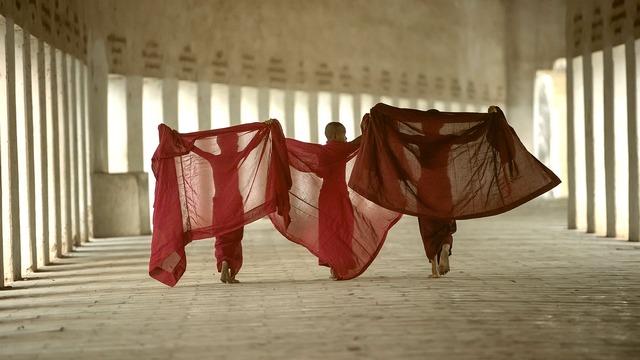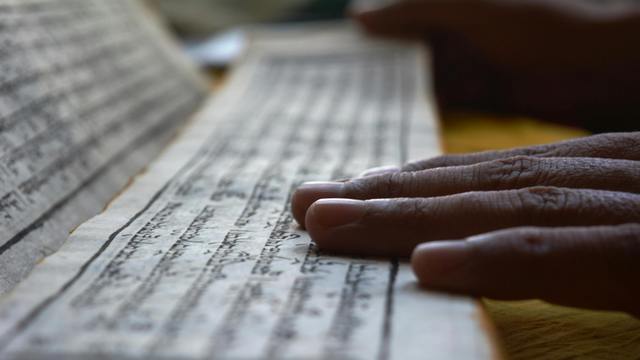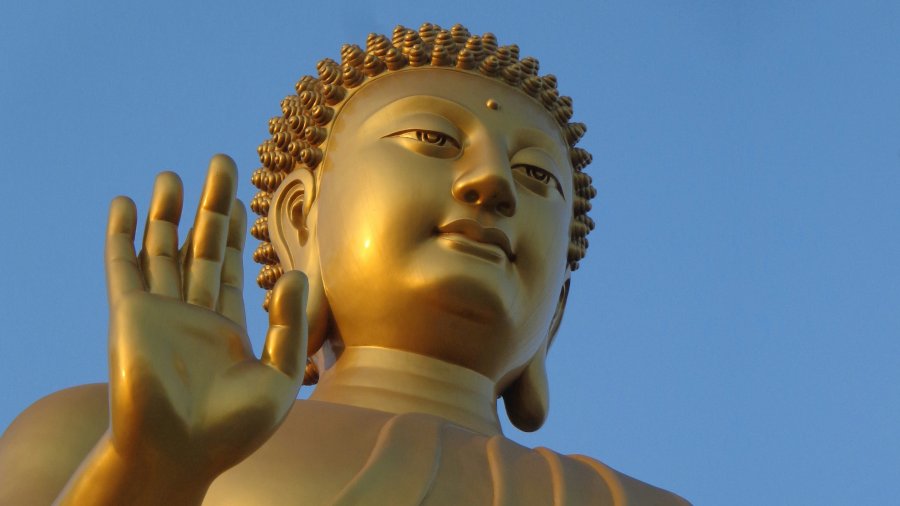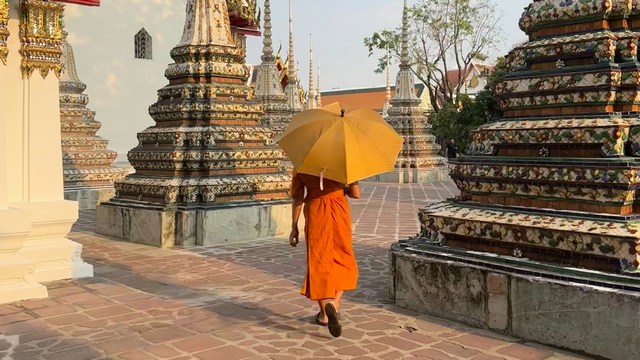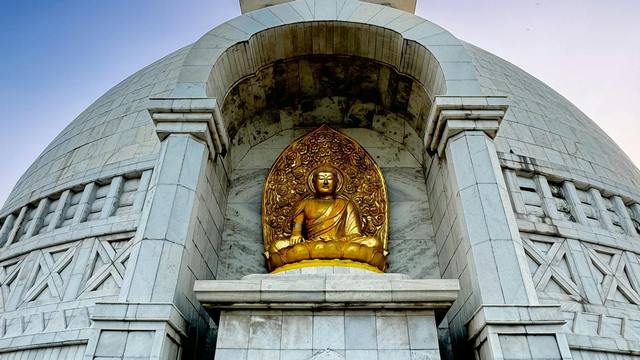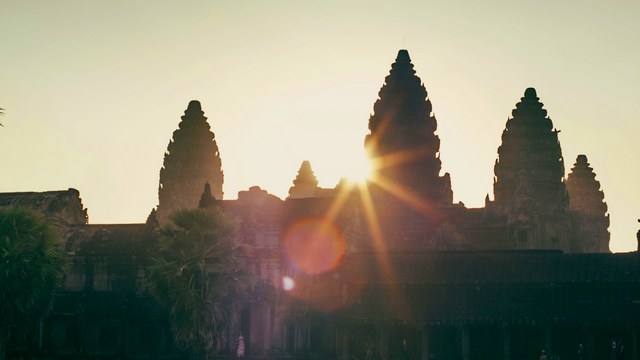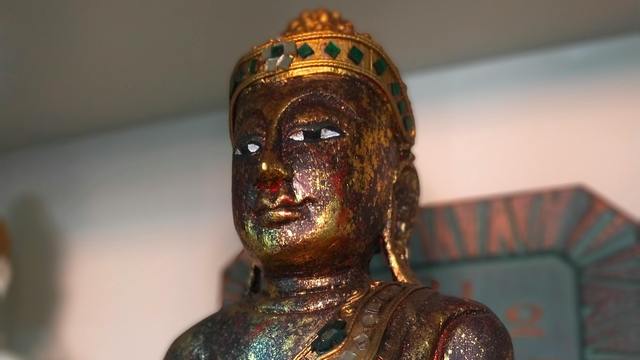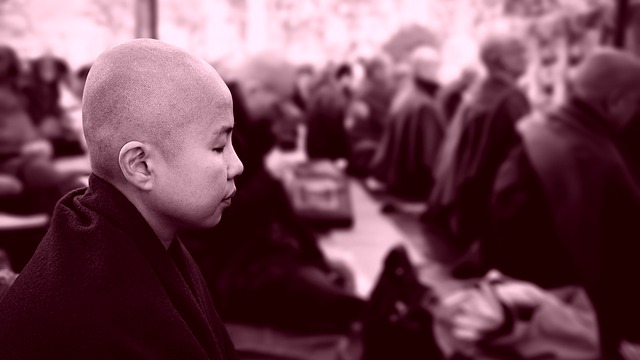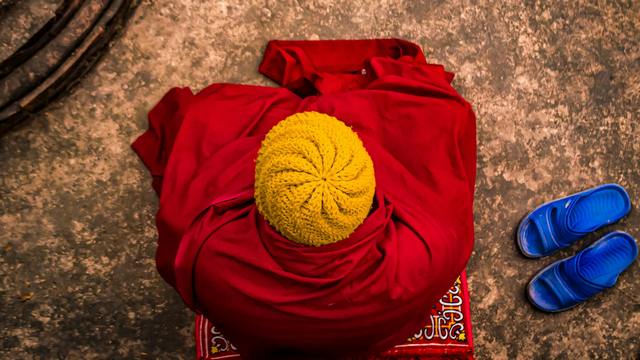[Note: One last long sutta to round out the month. Keep in mind that the “Others will be such and such…” parts are not to be taken as a way to blame others. Rather it is a way to think, “Even if other people do, I won’t do.”]
Thus have I heard. On one occasion the Blessed One was living at Sāvatthī in Jeta’s Grove, Anāthapiṇḍika’s Park.
Then, when it was evening, the venerable Mahā Cunda rose from meditation and went to the Blessed One. After paying homage to the Blessed One he sat down at one side and said to him:
“Venerable sir, various views arise in the world associated either with doctrines of a self or with doctrines about the world. Now does the abandoning and relinquishing of those views come about in a bhikkhu who is attending only to the beginning of his meditative training?”
“Cunda, as to those various views that arise in the world associated either with doctrines of a self or with doctrines about the world: if the object in relation to which those views arise, which they underlie, and which they are exercised upon is seen as it actually is with proper wisdom thus: ‘This is not mine, this I am not, this is not my self,’ then the abandoning and relinquishing of those views comes about.
The Eight Attainments
“It is possible here, Cunda, that quite secluded from sensual pleasures, secluded from unwholesome states, some bhikkhu enters upon and abides in the first jhāna, which is accompanied by applied and sustained thought, with rapture and pleasure born of seclusion. He might think thus: ‘I am abiding in effacement. ’ But it is not these attainments that are called ‘effacement’ in the Noble One’s Discipline: these are called ‘pleasant abidings here and now’ in the Noble One’s Discipline.
“It is possible here that with the stilling of applied and sustained thought, some bhikkhu enters upon and abides in the second jhāna, which has self-confidence and singleness of mind without applied and sustained thought, with rapture and pleasure born of concentration. He might think thus: ‘I am abiding in effacement.’ But…these are called ‘pleasant abidings here and now’ in the Noble One’s Discipline.
“It is possible here that with the fading away as well of rapture, some bhikkhu abides in equanimity, and mindful and fully aware, still feeling pleasure with the body, he enters upon and abides in the third jhāna, on account of which noble ones announce: ‘He has a pleasant abiding who has equanimity and is mindful.’ He might think thus: ‘I am abiding in effacement.’ But…these are called ‘pleasant abidings here and now’ in the Noble One’s Discipline.
“It is possible here that with the abandoning of pleasure and pain, and with the previous disappearance of joy and grief, some bhikkhu enters upon and abides in the fourth jhāna, which has neither-pain-nor-pleasure and purity of mindfulness due to equanimity. He might think thus: ‘I am abiding in effacement.’ But it is not these attainments that are called ‘effacement’ in the Noble One’s Discipline: these are called ‘pleasant abidings here and now’ in the Noble One’s Discipline.
“It is possible here that with the complete surmounting of perceptions of form, with the disappearance of perceptions of sensory impact, with non-attention to perceptions of diversity, aware that ‘space is infinite,’ some bhikkhu enters upon and abides in the base of infinite space. He might think thus: ‘I am abiding in effacement.’ But it is not these attainments that are called ‘effacement’ in the Noble One’s Discipline: these are called ‘peaceful abidings’ in the Noble One’s Discipline.
“It is possible here that by completely surmounting the base of infinite space, aware that ‘consciousness is infinite,’ some bhikkhu enters upon and abides in the base of infinite consciousness. He might think thus: ‘I am abiding in effacement.’ But…these are called ‘peaceful abidings’ in the Noble One’s Discipline.
“It is possible here that by completely surmounting the base of infinite consciousness, aware that ‘there is nothing,’ some bhikkhu enters upon and abides in the base of nothingness. He might think thus: ‘I am abiding in effacement.’ But…these are called ‘peaceful abidings’ in the Noble One’s Discipline.
“It is possible here that by completely surmounting the base of nothingness, some bhikkhu enters upon and abides in the base of neither-perception-nor-non-perception. He might think thus: ‘I am abiding in effacement.’ But these attainments are not called ‘effacement’ in the Noble One’s Discipline: these are called ‘peaceful abidings’ in the Noble One’s Discipline.
Effacement
“Now, Cunda, here effacement should be practised by you:
(1) ‘Others will be cruel; we shall not be cruel here’: effacement should be practised thus.
(2) ‘Others will kill living beings; we shall abstain from killing living beings here’: effacement should be practised thus.
(3) ‘Others will take what is not given; we shall abstain from taking what is not given here’: effacement should be practised thus.
(4) ‘Others will be uncelibate; we shall be celibate here’: effacement should be practised thus.
(5) ‘Others will speak falsehood; we shall abstain from false speech here’: effacement should be practised thus.
(6) ‘Others will speak maliciously; we shall abstain from malicious speech here’: effacement should be practised thus.
(7) ‘Others will speak harshly; we shall abstain from harsh speech here’: effacement should be practised thus.
(8) ‘Others will gossip; we shall abstain from gossip here’: effacement should be practised thus.
(9) ‘Others will be covetous; we shall be uncovetous here’: effacement should be practised thus.
(10) ‘Others will have ill will; we shall be without ill will here’: effacement should be practised thus.
(11) ‘Others will be of wrong view; we shall be of right view here’: effacement should be practised thus.
(12) ‘Others will be of wrong intention; we shall be of right intention here’: effacement should be practised thus.
(13) ‘Others will be of wrong speech; we shall be of right speech here’: effacement should be practised thus.
(14) ‘Others will be of wrong action; we shall be of right action here’: effacement should be practised thus.
(15) ‘Others will be of wrong livelihood; we shall be of right livelihood here’: effacement should be practised thus.
(16) ‘Others will be of wrong effort; we shall be of right effort here’: effacement should be practised thus.
(17) ‘Others will be of wrong mindfulness; we shall be of right mindfulness here’: effacement should be practised thus.
(18) ‘Others will be of wrong concentration; we shall be of right concentration here’: effacement should be practised thus.
(19) ‘Others will be of wrong knowledge; we shall be of right knowledge here’: effacement should be practised thus.
(20) ‘Others will be of wrong deliverance; we shall be of right deliverance here’: effacement should be practised thus.
(21) ‘Others will be overcome by sloth and torpor; we shall be free from sloth and torpor here’: effacement should be practised thus.
(22) ‘Others will be restless; we shall not be restless here’: effacement should be practised thus.
(23) ‘Others will be doubters; we shall go beyond doubt here’: effacement should be practised thus.
(24) ‘Others will be angry; we shall not be angry here’: effacement should be practised thus.
(25) ‘Others will be resentful; we shall not be resentful here’: effacement should be practised thus.
(26) ‘Others will be contemptuous; we shall not be contemptuous here’: effacement should be practised thus.
(27) ‘Others will be insolent; we shall not be insolent here’: effacement should be practised thus.
(28) ‘Others will be envious; we shall not be envious here’: effacement should be practised thus.
(29) ‘Others will be avaricious; we shall not be avaricious here’: effacement should be practised thus.
(30) ‘Others will be fraudulent; we shall not be fraudulent here’: effacement should be practised thus.
(31) ‘Others will be deceitful; we shall not be deceitful here’: effacement should be practised thus.
(32) ‘Others will be obstinate; we shall not be obstinate here’: effacement should be practised thus.
(33) ‘Others will be arrogant; we shall not be arrogant here’: effacement should be practised thus.
(34) ‘Others will be difficult to admonish; we shall be easy to admonish here’: effacement should be practised thus.
(35) ‘Others will have bad friends; we shall have good friends here’: effacement should be practised thus.
(36) ‘Others will be negligent; we shall be diligent here’: effacement should be practised thus.
(37) ‘Others will be faithless; we shall be faithful here’: effacement should be practised thus.
(38) ‘Others will be shameless; we shall be shameful here’: effacement should be practised thus.
(39) ‘Others will have no fear of wrongdoing; we shall be afraid of wrongdoing here’: effacement should be practised thus.
(40) ‘Others will be of little learning; we shall be of great learning here’: effacement should be practised thus.
(41) ‘Others will be lazy; we shall be energetic here’: effacement should be practised thus.
(42) ‘Others will be unmindful; we shall be established in mindfulness here’: effacement should be practised thus.
(43) ‘Others will lack wisdom; we shall possess wisdom here’: effacement should be practised thus.
(44) ‘Others will adhere to their own views, hold on to them tenaciously, and relinquish them with difficulty; we shall not adhere to our own views or hold on to them tenaciously, but shall relinquish them easily’: effacement should be practised thus.
Inclination of Mind
“Cunda, I say that even the inclination of mind towards wholesome states is of great benefit, so what should be said of bodily and verbal acts conforming to such a state of mind? Therefore, Cunda:
(1) Mind should be inclined thus: ‘Others will be cruel; we shall not be cruel here.’
(2) Mind should be inclined thus: ‘Others will kill living beings; we shall abstain from killing living beings here.’
(3–43) Mind should be inclined thus:…
(44) Mind should be inclined thus: ‘Others will adhere to their own views, hold on to them tenaciously, and relinquish them with difficulty; we shall not adhere to our own views or hold on to them tenaciously, but shall relinquish them easily.’
Avoidance
“Cunda, suppose there were an uneven path and another even path by which to avoid it; and suppose there were an uneven ford and another even ford by which to avoid it. So too:
(1) A person given to cruelty has non-cruelty by which to avoid it.
(2) One given to killing living beings has abstention from killing living beings by which to avoid it.
(3) One given to taking what is not given has abstention from taking what is not given by which to avoid it.
(4) One given to be uncelibate has celibacy by which to avoid it.
(5) One given to false speech has abstention from false speech by which to avoid it.
(6) One given to malicious speech has abstention from malicious speech by which to avoid it.
(7) One given to harsh speech has abstention from harsh speech by which to avoid it.
(8) One given to gossip has abstention from gossip by which to avoid it.
(9) One given to covetousness has uncovetousness by which to avoid it.
(10) One given to ill will has non-ill will by which to avoid it.
(11) One given to wrong view has right view by which to avoid it.
(12) One given to wrong intention has right intention by which to avoid it.
(13) One given to wrong speech has right speech by which to avoid it.
(14) One given to wrong action has right action by which to avoid it.
(15) One given to wrong livelihood has right livelihood by which to avoid it.
(16) One given to wrong effort has right effort by which to avoid it.
(17) One given to wrong mindfulness has right mindfulness by which to avoid it.
(18) One given to wrong concentration has right concentration by which to avoid it.
(19) One given to wrong knowledge has right knowledge by which to avoid it.
(20) One given to wrong deliverance has right deliverance by which to avoid it.
(21) One given to sloth and torpor has freedom from sloth and torpor by which to avoid it.
(22) One given to restlessness has non-restlessness by which to avoid it.
(23) One given to doubt has the state beyond doubt by which to avoid it.
(24) One given to anger has non-anger by which to avoid it.
(25) One given to resentment has non-resentment by which to avoid it.
(26) One given to contempt has non-contempt by which to avoid it.
(27) One given to insolence has non-insolence by which to avoid it.
(28) One given to envy has non-envy by which to avoid it.
(29) One given to avarice has non-avarice by which to avoid it.
(30) One given to fraud has non-fraud by which to avoid it.
(31) One given to deceit has non-deceit by which to avoid it.
(32) One given to obstinacy has non-obstinacy by which to avoid it.
(33) One given to arrogance has non-arrogance by which to avoid it.
(34) One given to being difficult to admonish has being easy to admonish by which to avoid it.
(35) One given to making bad friends has making good friends by which to avoid it.
(36) One given to negligence has diligence by which to avoid it.
(37) One given to faithlessness has faith by which to avoid it.
(38) One given to shamelessness has shame by which to avoid it.
(39) One given to fearlessness of wrongdoing has fear of wrongdoing by which to avoid it.
(40) One given to little learning has great learning by which to avoid it.
(41) One given to laziness has the arousal of energy by which to avoid it.
(42) One given to unmindfulness has the establishment of mindfulness by which to avoid it.
(43) One given to lack of wisdom has the acquisition of wisdom by which to avoid it.
(44) One given to adhere to his own views, who holds on to them tenaciously and relinquishes them with difficulty, has non-adherence to his own views, not holding on to them tenaciously and relinquishing them easily, by which to avoid it.
The Way Leading Upwards
“Cunda, just as all unwholesome states lead downwards and all wholesome states lead upwards, so too:
(1) A person given to cruelty has non-cruelty to lead him upwards.
(2) One given to killing living beings has abstention from killing living beings to lead him upwards.
(3–43) One given to…to lead him upwards.
(44) One given to adhere to his own views, who holds on to them tenaciously and relinquishes them with difficulty, has non-adherence to his own views, not holding on to them tenaciously and relinquishing them easily, to lead him upwards.
The Way of Extinguishing
“Cunda, that one who is himself sinking in the mud should pull out another who is sinking in the mud is impossible; that one who is not himself sinking in the mud should pull out another who is sinking in the mud is possible. That one who is himself untamed, undisciplined, with defilements unextinguished, should tame another, discipline him, and help extinguish his defilements is impossible; that one who is himself tamed, disciplined, with defilements extinguished, should tame another, discipline him, and help extinguish his defilements is possible. So too:
(1) A person given to cruelty has non-cruelty by which to extinguish it.
(2) One given to killing living beings has abstention from killing living beings by which to extinguish it.
(3–43) One given to… …by which to extinguish it.
(44) One given to adhere to his own views, who holds on to them tenaciously and relinquishes them with difficulty, has non-adherence to his own views, not holding on to them tenaciously and relinquishing them easily, by which to extinguish it.
Conclusion
“So, Cunda, the way of effacement has been taught by me, the way of inclining the mind has been taught by me, the way of avoidance has been taught by me, the way leading upwards has been taught by me, and the way of extinguishing has been taught by me.
“What should be done for his disciples out of compassion by a teacher who seeks their welfare and has compassion for them, that I have done for you, Cunda. There are these roots of trees, these empty huts. Meditate, Cunda, do not delay or else you will regret it later. This is our instruction to you.”
That is what the Blessed One said. The venerable Mahā Cunda was satisfied and delighted in the Blessed One’s words.
Read this translation of Majjhima Nikāya 8 Sallekhasutta: Effacement by Bhikkhu Bodhi on SuttaCentral.net. Or read a different translation on SuttaCentral.net, DhammaTalks.org or AccessToInsight.org. Or listen on PaliAudio.com or SC-Voice.net. Or explore the Pali on DigitalPaliReader.online.
Or read a translation in Deutsch, ગુજરાતી, Polski, Русский, Srpski, বাংলা, Català, Čeština, Español, Français, हिन्दी, Magyar, Bahasa Indonesia, Italiano, 日本語, 한국어/조선말, မြန်မာဘာသာ, Norsk, Português, සිංහල, Slovenščina, ไทย, Tiếng Việt, or 汉语. Learn how to find your language.

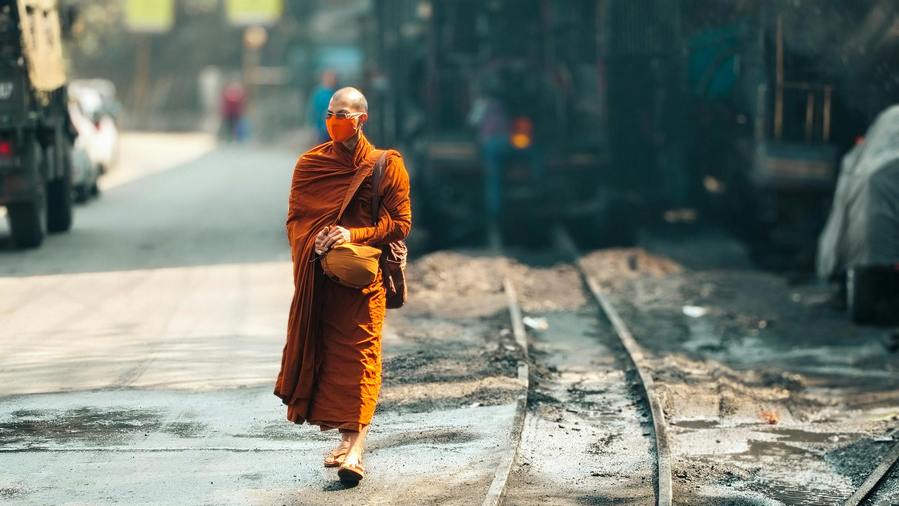
 Copyright: Creative Commons Zero (CC0) To the extent possible under law, Bhikkhu Sujato has waived all copyright and related or neighboring rights to his own translations on
Copyright: Creative Commons Zero (CC0) To the extent possible under law, Bhikkhu Sujato has waived all copyright and related or neighboring rights to his own translations on 


 All translations on this site by Bhikkhu Bodhi are licensed under a Creative Commons Attribution-NonCommercial-NoDerivs 3.0 Unported License.
Bhikkhu Bodhi, The Middle Length Discourses of the Buddha (Wisdom Publications, 2009), The Connected Discourses of the Buddha (Wisdom Publications, 2000), The Numerical Discourses of the Buddha (Wisdom Publications, 2012).
All translations on this site by Bhikkhu Bodhi are licensed under a Creative Commons Attribution-NonCommercial-NoDerivs 3.0 Unported License.
Bhikkhu Bodhi, The Middle Length Discourses of the Buddha (Wisdom Publications, 2009), The Connected Discourses of the Buddha (Wisdom Publications, 2000), The Numerical Discourses of the Buddha (Wisdom Publications, 2012).


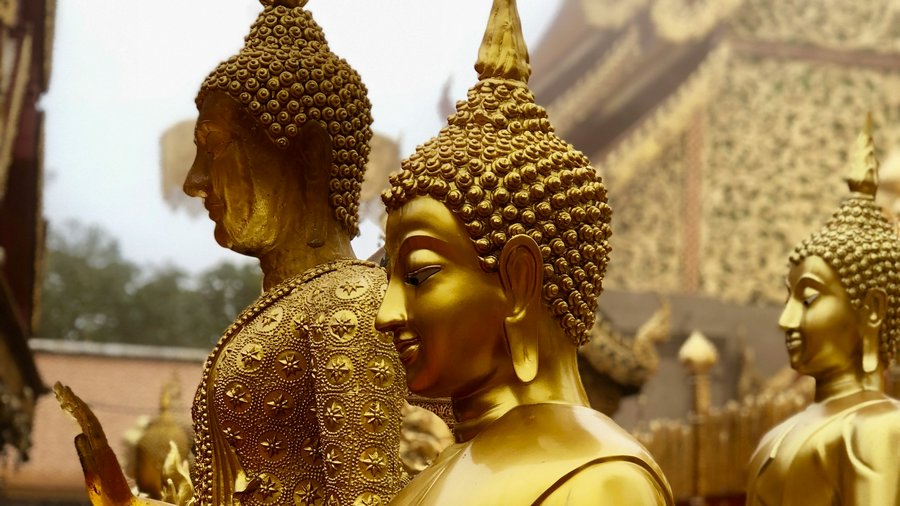
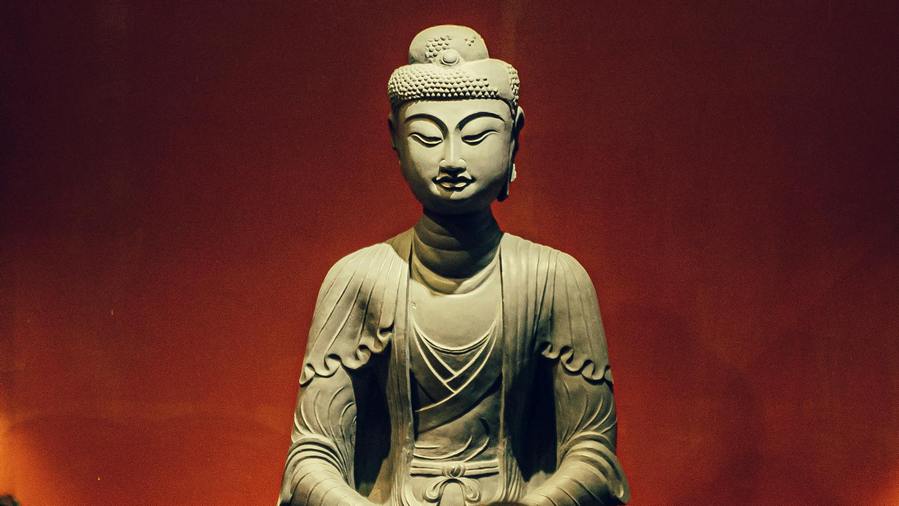
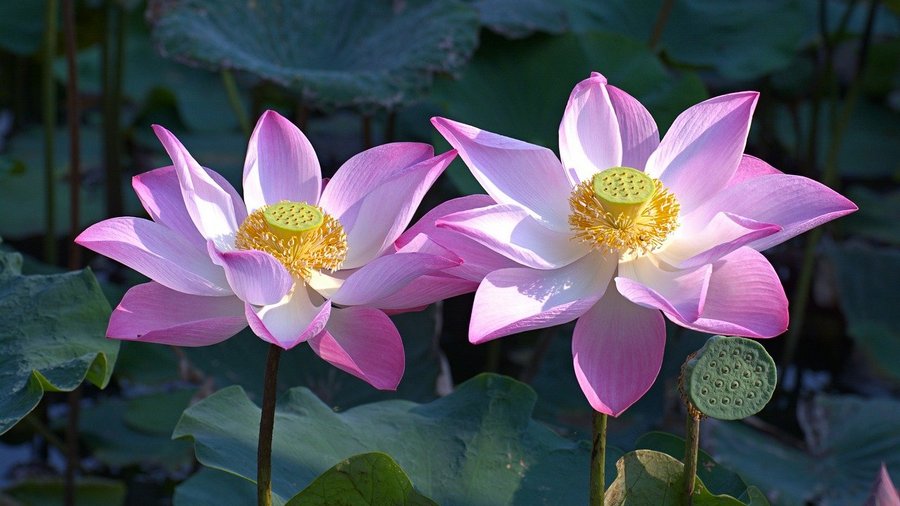
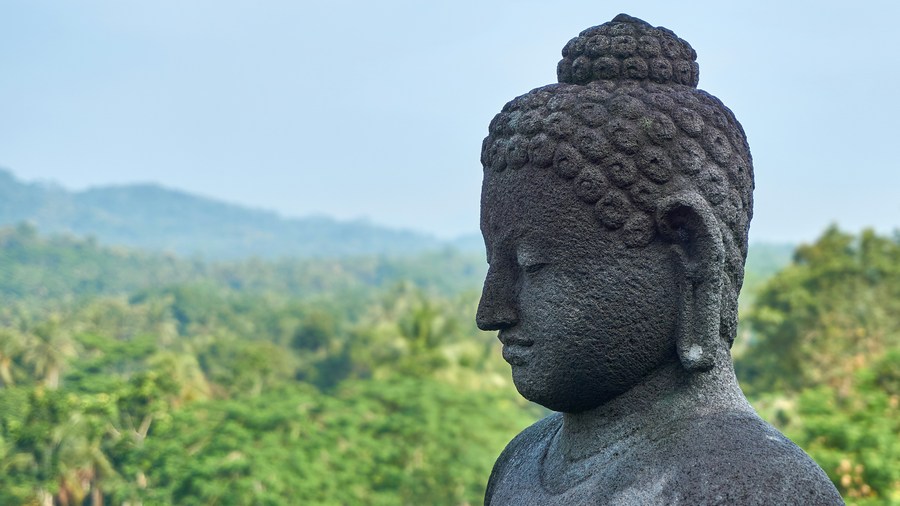


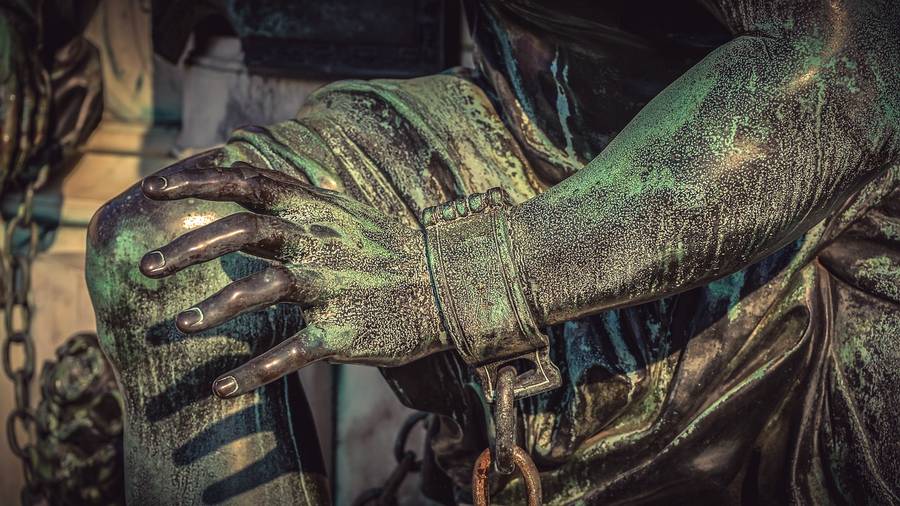
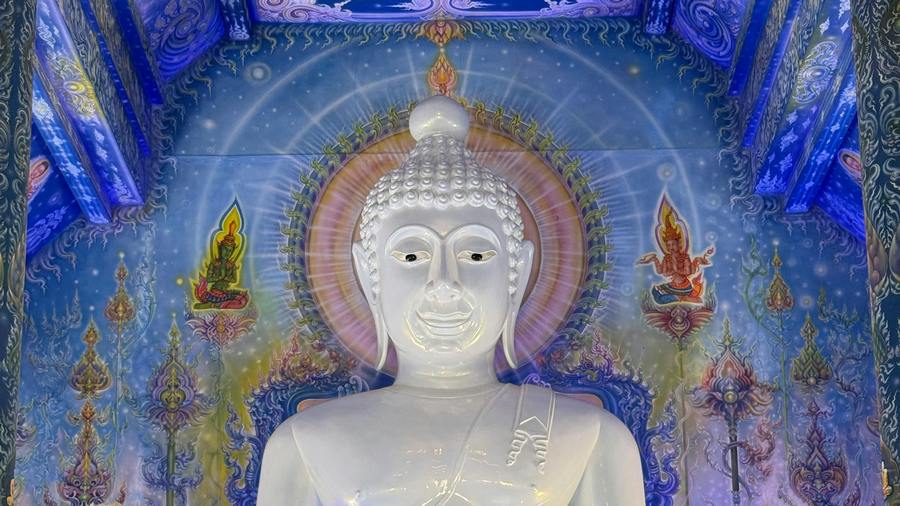

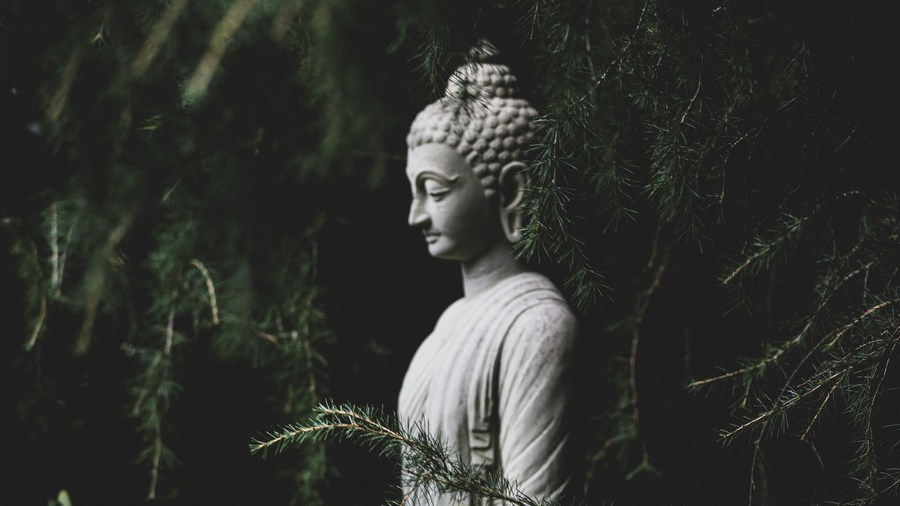

 Translations by Bhikkhu Ṭhanissaro are released under the Creative Commons Attribution-NonCommercial 4.0 Unported License. The author considers any sale, including by non-profit entities for non-profit purposes, to be ‘Commercial’ and a copyright violation. To view a copy of this license, visit the
Translations by Bhikkhu Ṭhanissaro are released under the Creative Commons Attribution-NonCommercial 4.0 Unported License. The author considers any sale, including by non-profit entities for non-profit purposes, to be ‘Commercial’ and a copyright violation. To view a copy of this license, visit the 